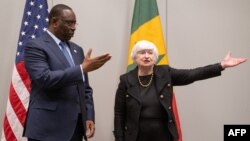U.S. Treasury Secretary Janet Yellen is set to start her Africa visit on Friday where she will stop in Senegal, Zambia and wrap up in South Africa.
In a speech to be delivered at a business event in Senegal’s capital Dakar, Yellen maps out Washington’s vision for strengthening U.S.-Africa ties after decades in which America’s strategic rival China dominated lending and investment across the continent.
"The United States is here as a partner to help Africa realize its massive economic potential at home and advance its growing leadership abroad," said Yellen in her prepared remarks.
"Our engagement is not transactional, for show, or for the short-term. We are here to work with you as friends and partners for the long haul- through moments of stress and times of opportunity," she said, without directly mentioning China.
President Joe Biden, Vice President Kamala Harris, U.S. Trade Representative Katherine Tai and Commerce Secretary Gina Raimondo are among Washington’s leaders that are expected to travel to Africa this year.
Joseph Siegle, the director of research at Africa Center for Strategic Studies in Washington, says the scheduled trips by U.S. officials to Africa is a show that Washington is looking to deepen its economic ties with Africa.
"I think it’s also notable that Africa is a very economically dynamic region which has a rapidly growing population, growing middle class and by 2050 Africa is expected to account for $16 trillion in spending," Siegle said.
"There is a lot of shared opportunities that both sides have in seeing this relationship deepen," he added.
Ebenezer Obadare, the Douglas Dillon senior fellow for African studies at the Council on Foreign Relations, echoed Siegle’s sentiments.
"This news, that all these important personalities in an American context are going to visit Africa at different times throughout the year, signals that America is ready to put money where its mouth is," Obadare said.
"From an African perspective, that’s an excellent sign," added Obadare.
Information in this report came from Reuters. VOA's Yeheyes Wuhib and Mohamed Elshinnawi also contributed to this report.
